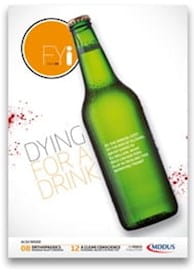A FRENCH physician named Nicolas Andry published a book in the year 1741 entitled Orthopédie, principally about correcting spinal and limb deformities in children. Though popular in its day, the book’s most enduring attribute is its title, from which the term orthopaedics is derived.
Orthopaedics refers to the specialty of trauma and orthopaedic surgery. It is one of the largest of the surgical specialties and deals with the treatment of musculoskeletal conditions – either traumatic injury or diseases and infection. Over 20 per cent of GP attendances are for musculoskeletal problems and this represents a massive cost to the NHS – over £3 billion per year.
Orthopaedists work mostly in hospital settings, usually with accident and emergency facilities and the role involves team working with surgical and medical colleagues (e.g. paediatricians, rheumatologists, geriatricians) as well as outpatient staff, theatre staff and hospital managers. UK consultants in orthopaedics operate around 40 per cent of the time, with the rest of their day divided between clinics, ward work and on-call commitments.
An orthopaedic surgeon writing in the British Orthopaedic Association Undergraduate Guide 2011 comments: “One of the main attractions of Orthopaedics as a career is the fact that our interventions can rapidly and dramatically improve quality of life for patients. It combines theoretical knowledge with practical skills but also involves an interface with technology, industry and the multidisciplinary team unmatched by any other specialty.”
A long road
Both “uncoupled” and “run-through” training posts in trauma and orthopaedic surgery are available upon completion of Foundation year 2. “Uncoupled” posts involve two years of core surgical training (CT1/2), followed by another competitive application system for higher specialist training (ST3+). “Run-through” training involves a commitment to orthopaedics in ST1 with automatic progression to ST3+, as long as a candidate satisfies the competency requirements.
The trauma and orthopaedic curriculum is governed by the Intercollegiate Surgical Curriculum Programme (ISCP) and it breaks down into stages: intermediate (ST3-6) and final (ST6-8) years.
The intermediate years offer focused orthopaedic training, concentrating on trauma management and the generality of elective practice. Time will be spent in theatre both assisting the consultant and performing operations under supervision. In addition there are ward rounds and orthopaedic and fracture clinics dealing with referrals and follow-ups. The culmination of this phase of training is attainment of the FRCS (T&O) exam.
In the final years of training, orthopaedic surgeons usually develop an interest in one particular sub-specialty. These include:
• foot and ankle surgery
• knee surgery
• hip surgery
• upper limb surgery
• paediatric surgery
• spinal surgery
• sports injuries surgery
• trauma surgery.
Candidates at the end of a successful training programme are awarded a Certificate of Completion of Training (CCT) and become eligible to join the specialist register and apply for consultant posts.
Getting in
Competition for orthopaedic specialty training posts is fierce. Applications open within the first half of Foundation year 2 and all core surgery interviews follow the same structure nationally. Interviews are comprised of three 10 minute stations – a clinical scenario, management station and portfolio station. All interviews will require you to provide evidence of your achievements such as elogbook records, an eportfolio, an educational supervisor’s report and certificates.
Students or foundation trainees keen on orthopaedics should start early to enhance their chances of attaining a post. Arrange surgical placements in T&O and find a mentor to help guide you through the process. Getting involved in audit or research at an early stage is critical for improving your CV and demonstrating your commitment and work ethic.
Many hospitals offer foundation doctors taster weeks in chosen specialties and this is another great opportunity to show an interest in orthopaedics and to get into theatre. Attaining certificates of achievement for Basic Surgical Skills, ALS, ATLS and other surgical courses also shows your commitment to surgery while providing you with ways to bolster your practical skills.
Attending orthopaedic events will also demonstrate your commitment to the specialty. The British Orthopaedic Trainees Association (BOTA) has recently extended its membership to junior trainees from Foundation year 1 upwards to provide support and opportunities for juniors interested in orthopaedics.
For more information on a career in trauma and orthopaedic surgery check out:
• British Orthopaedic Association www.boa.ac.uk
• British Orthopaedic Trainees Association www.bota.org.uk
• Future Orthopaedic Surgeons www.futureorthopaedicsurgeons.com
Q&A Mr Sam Molyneux orthopaedic surgeon
What attracted you to trauma and orthopaedic surgery?
I trained on a three year basic surgical rotation and experienced several different surgical specialties. I liked the massive variety in orthopaedics, ranging from infant hip surgery to the young athlete struggling to maximise performance to the severely injured patient struggling to survive. I loved the logical nature of the surgery with its complex balance between mechanics and biology. I loved the range of surgical techniques from nerve repair under a microscope to hitting things (very accurately!) with a large hammer. I had, and still have, an almost childish delight at all the shiny hi-tech toys we get to play with in orthopaedics. I liked the fact that most patients get vast improvements in their quality of life very quickly. Finally, the senior trainees and consultants seemed to really enjoy their day-to-day work.
What do you find most challenging about the job?
There is an incredible amount to know and learning it takes time. Keeping up with developments in the literature is a lifelong task. Managing to do this while learning a whole new set of manual and technical skills, doing your day-to-day job and having a life is a difficult balance. You have to learn early on in your career how to be efficient but thorough.
Has anything surprised you about the specialty?
Patient interaction and counselling is incredibly important in orthopaedics. Many operations are not lifesaving but life-altering (for instance a knee replacement) and making a joint decision with patients about their best treatment options is one of the biggest determinants of satisfaction. All those months I spent at medical school learning about the importance of social history, ideas, concerns and expectations have proved invaluable.
What do you consider the most important personal characteristic in a good orthopaedic surgeon?
I think most of the important characteristics for orthopaedics are shared with all the surgical specialties – enthusiasm, perseverance, perfectionism, a good work ethic, the ability to work in a team, the ability to cope in a crisis. In orthopaedics, however, I think the ability to get on with your colleagues is especially important. The job is extremely busy and lots of patients end up being handed on between and within subspecialties. It’s important to be able to discuss challenging patients with each other and help each other as needed. Also, most post-op X-rays in orthopaedics end up being reviewed in daily or weekly meetings – the banter that ensues is an important way of maximising quality and sharing ideas for improvement. You have to be able to take both criticism and compliments well and give them both judiciously.
What is your most memorable experience so far?
I think what I’m doing at the moment – I’m on a trauma fellowship in Vancouver, Canada and in the last week seem to have seen every variant of major open fracture in the book. There is something special about finishing major pelvic fracture surgery and then heading off to the beach for a barbecue.
Is there any advice you could give to a final year or FY trainee considering trauma and orthopaedics?
Get some experience and get some research published or presented. If you’re not working in orthopaedics go and collar your nearest orthopaedic consultant and confess your love of the specialty to them. Most will have some project or other you can join in with or complete and most will be happy to have you along to theatre or clinic for a few sessions. Let’s face it, telling someone that you think what they do is fantastic and you desperately want to be like them is never going to go down badly. Most of all, though, go for it. I love my job and have never once regretted my choice of career.
This page was correct at the time of publication. Any guidance is intended as general guidance for members only. If you are a member and need specific advice relating to your own circumstances, please contact one of our advisers.
Read more from this issue of FYi

Save this article
Save this article to a list of favourite articles which members can access in their account.
Save to library

